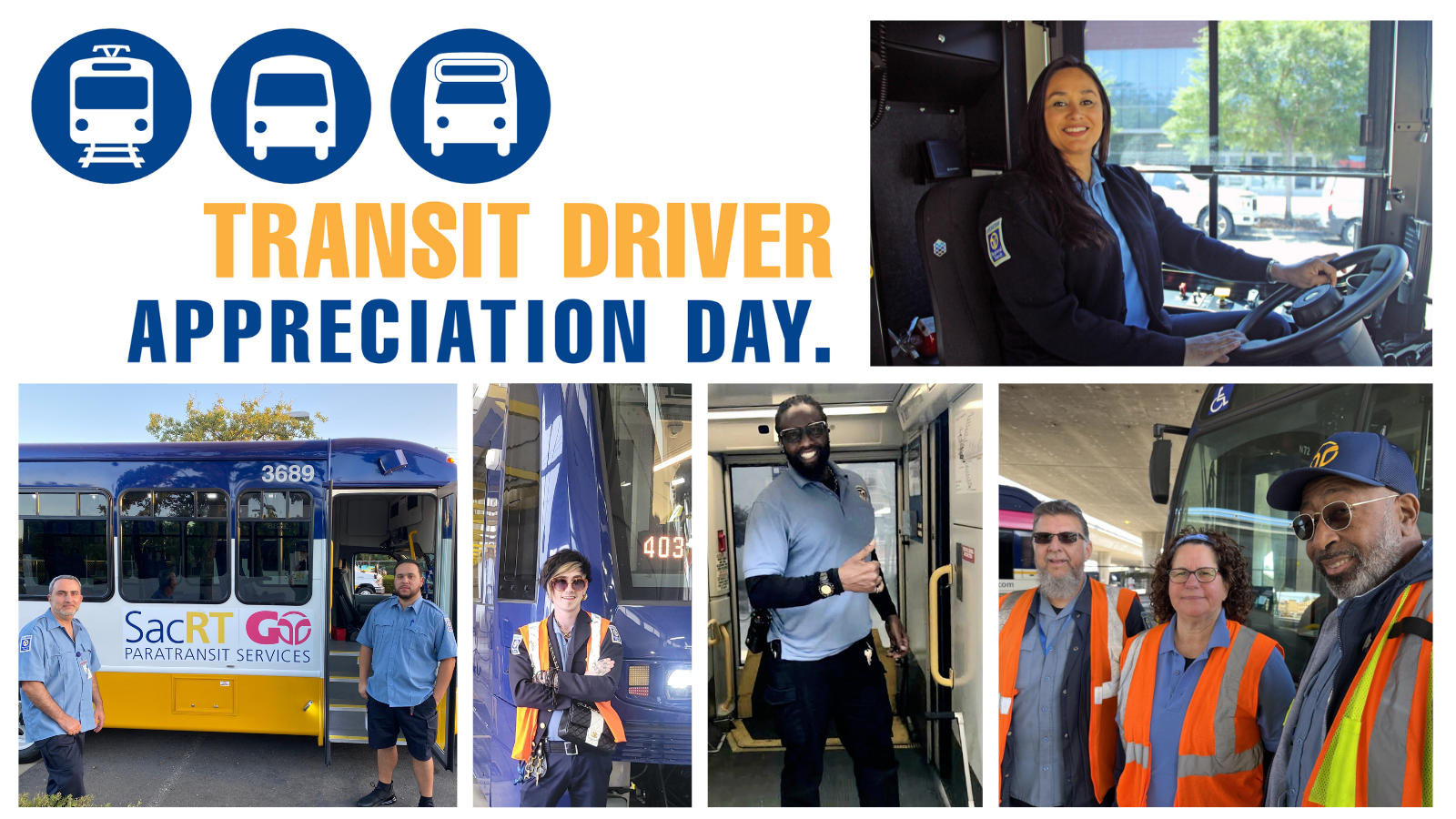Our operators are the face of SacRT in the community
We celebrate their service on Transit Driver Appreciation Day!

What does it take to be a good transit operator?
It’s a question we posed to a few of our Sacramento Regional Transit District (SacRT) bus and light rail operators as part of our commemoration of the annual Transit Driver Appreciation Day, March 18.
Bus operators Tracy Windsor, Heidi Damian and Ricardo Rivas, and light rail operators Brandon White and Brian Porter have more than 80 years of experience among them.
Yes, they said, it takes skill to operate a transit vehicle. But that just involves practice and diligence.
It’s really social skills that count, our operators say. You don’t have to be an extrovert. You don’t have to be everybody’s friend. But, “you have to like people,” Ricardo Rivas said. “I greet everybody who comes on the bus. There are always some people who will push your buttons. But you have to let it go.”
Brian Porter, a light rail operator for 10 years, agrees. His job includes helping the elderly and individuals with disabilities get from the station ramp onto the train. “I love my ‘ramp’ customers,” he said. “They’re appreciative. I have to stop them from bringing me sweets.”
Transit operators (and transit ambassadors as well) are the face of SacRT in the community. They interact on a daily basis with thousands of Sacramentans. It can be challenging. The people stepping onto transit vehicles come in all types, from all walks of life, and in all moods.
But serving SacRT’s customers is a big part of what makes the job rewarding, the operators say. “It’s the best thing I’ve ever done, the best job I’ve ever had,” said Rivas, who has been driving buses for SacRT for eight years. “It’s fun. The money’s good too.”
Transit operators set the tone
Brandon White, a light rail operator for two years, already is a well-known face. It’s partly because of his colorful style (His nickname is Hollywood). But it’s also his demeanor. When kids wave at him in his cab, or when people take videos of the passing train, he doesn’t just wave back. “I do my happy hands dance,” he said. “I do it for kids. For anyone.”
“I take the safety aspects of my job seriously,” White said, “but you have to have fun. When I come out of the cab, I greet everybody. What the train operator projects can set the mood, the atmosphere.”
SacRT is hiring transit operators (drivers) right now. The agency is offering $2,000 signing bonuses for people who qualify for a driver position. SacRT will help those people get their commercial driver license, which includes paid on the job training. The job has a benefits package that includes medical, dental, vision, as well as paid sick leave and a retirement plan. For more information, visit https://www.sacrt.com/careers.
Tracy Windsor, a 30-year veteran, says the job always offers something new. “It’s never the same job two days in a row,” even when he is driving the same route daily. “I get to know people and they get to trust me.”
Heidi Damian, a driver for 32-plus years, loves to listen to riders who want to tell her about their day or even their lives. In fact, she keeps a journal at home of stories riders tell her. It started in 1990. “A guy got on the bus and told me this story about himself, and I thought, I have to write that down!” she said. “If anybody gets on the bus and starts talking to me about their life, I just listen.”
Not all riders are friendly, or even polite. Some of them may be bringing personal problems onto the ride. It’s important to try not to take it personally, operators say.
“The person who cusses you out, they may be having a bad day,” Damian said. “You just treat people how you want to be treated. Over time, even the worst person becomes pleasant. I’ll say, ‘I understand you're upset, sir. Just come on in, relax, and let me take you where you need to go.’”
One teenage girl, who had been disrespectful, ultimately apologized, saying, “I’m sorry, bus driver,” after Damian told the young woman she forgave her and believed that God had better things in store for her.
Drivers make judgment calls
Transit operators can call for assistance if they encounter nuisance behavior. They can get assistance from a supervisor or SacRT police services officials will arrive to handle the situation. However, the transit agency gives operators the leeway to make judgment calls. That may mean working with a rider, if the circumstances warrant that.
Porter, who operates light rail, said one of the biggest issues light rail operators face is people walking or standing near the tracks who are not aware that a train is approaching. That’s when the job can get a little tense.
“We ‘gong,’” he said. But if the situation is urgent, such as a person on or near the tracks with earphones who appears not to notice the train, “we go to the horn. That just blasts! We don’t want to scare anyone, but you have to get their attention.”
Being the public face of SacRT also means dealing with nonstop questions, usually about routes and schedules. Sometimes, though, the questions are odd or amusing.
Rivas, who drives a different route every day, recently had a person get on and ask: “Do you go by the McDonalds?” He had to stop and think, is there a McDonald’s on this route?
Windsor says the biggest lesson he has learned is that people are just people, from persons experiencing homelessness with a voucher to the well-dressed worker heading to a downtown office job.
“Doing this job teaches you humility,” he said. “You are not better than anybody out there. The person who looks like they are suffering is a human just like you. If we are compassionate to those riding with us, we’ll see that come back to us.”
Help us thank our transit operators, by giving an extra special thank you this Friday, March 17 and Saturday, March 18 (Transit Driver Appreciation Day) or fill out the online form below to send them a note.





